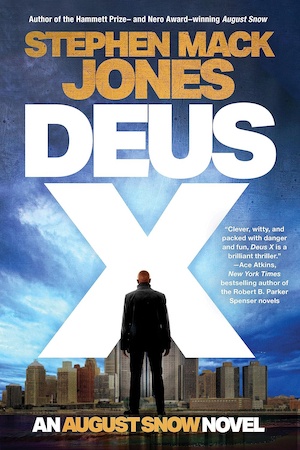In The Goodbye Coast, author Joe Ide abandons his popular crime-solver Isaiah Quintabe in favour of a 21st century private investigator: Philip Marlowe. Yes, really! Raymond Chandler’s definitive detective has been reinvented by Ide and he’s working on two compelling missing persons cases at once.
In his acknowledgements, Ide quotes Chandler himself, who once claimed there are no classics of crime and detection fiction, but Ide maintains that Chandler came closer than anyone. He was Ide’s original writing inspiration, and that of many other writers, and attracted millions of fans. Movies made from his books helped define film noir, with Humphrey Bogart’s Marlowe an indelible representation of the cynical, world-weary PI of hardboiled crime fiction.
Undertaking to write what’s billed as a modern version of such an icon is a more than a bit cheeky. How well did Ide do? He succeeds to some extent – he has the cynicism and wisecracking down and the occasional skewering of the establishment. He leaves most of the hard drinking to a character invented for this story, Philip’s father, Emmet Marlowe, a Los Angeles homicide detective on leave to dry out after the death of his wife, Philip’s mother. The modern Marlowe shares his namesake’s tendency for insubordination, which cost him his place in the police academy and led him to a mentorship with low-rent private detective, Basilio Ignacia.
Marlowe’s new client is fading movie star Kendra James, whose husband Terry was shot dead on the beach in front of their Malibu home a few weeks earlier. Terry was a failed movie producer desperately trying for one last big score. His 17-year-old daughter Cody has gone missing, and Kendra wants Marlowe to find her.
Before long Basilio drops another case in Marlowe’s lap – unwanted, but there it is. A woman has flown in from London to try to find her son Jeremy, kidnapped by her ex-husband and, presumably, brought back to his home town.
The theme of parents and children – and how these relationships can go terribly wrong, warping a person’s actions and reactions – permeates The Goodbye Coast. In the case of Ren and her kidnapped son, the ex-husband is the problem, and she’s become monomaniacal about getting Jeremy back. In the case of Kendra and Cody, neither of them has a compassionate or generous bone in their bodies. No way could a healthy relationship evolve. Marlowe gets along with his dad, mostly, because he’s repressed his anger about his father’s neglect of his mother as she was dying. Emmet’s drinking shows he feels that too, of course.
While you can chuckle at the relentless snark of Cody, only because it’s not directed at you, and enjoy the less caustic jibes of Ren (who’s English, after all), neither one of these females listens to Marlowe or takes his advice. Stay in your car until I get there? Not a chance. Don’t go there by yourself? Already out the door. Needless to say, their incautious behaviour leads to worlds of trouble.
Marlowe uses his connections in the film industry, mostly in the form of past clients who are still speaking to him, to try to get a lead on Jeremy. Once he’s found Cody, he’s suspicious of her stepmother’s intentions and stashes her at his dad’s house until he can sort things out. Unfortunately, the situation is far more complicated and deadly than he anticipates, involving the Russian mob, Armenian hitmen, a Bosnian assassin and Cody’s brother who is a gay minor league baseball player.
As a big fan of Ide’s IQ books, I think he misses the mark here. There are just too many violent confrontations and climaxes. It’s like a movie with endless car chases and shootouts. Non-stop action is tiring. At the end, I felt like somebody just beat me up.
In a rare period of quiet near the story’s end, Marlowe reviews his notes and comes up with a theory about who killed Terry that he thinks holds water. His conclusions come very close to violating a basic principle of mystery-writing. Don’t introduce new clues at the end. At least two pieces of his explanation relied on information I did not have. Perhaps I missed these elements in the reading, but I don’t think so.
Finally, one of the pleasures of reading Chandler is his unforgettable deployment of metaphor. Ide is quite skilled with the language, and writes in an effective, forceful way, but, as this is a homage, I expected a few high-flown metaphors. Maybe they wouldn’t feel right in 2022, but I missed them.
Also see The Black Eyed Blonde by Benjamin Black (John Banville) or Only to Sleep by Lawrence Osbourne, both of which feature alternative takes Philip Marlowe.
Mulholland Books
Print/Kindle/iBook
£7.99
CFL Rating: 4 Stars





